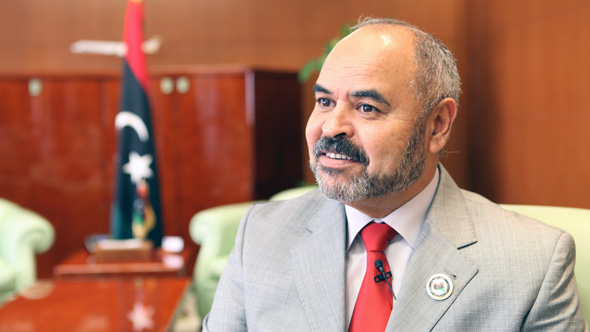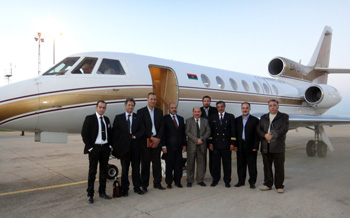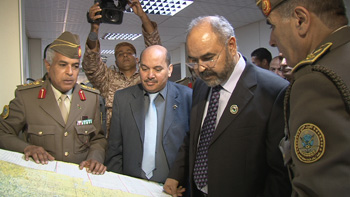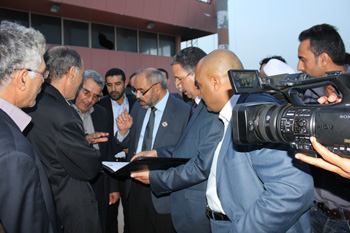Libyan Ministry of Transportation: New deals for ports, airports, railways and road projects
Abdel-Qader Mohamed Ahmed Al-Ayib, Minister of Transportation of Libya
The infrastructure in Libya has been damaged in all areas during the revolution or during the pre-revolution period and all the projects have been detained, so the Ministry of Transport of Libya has to take on a huge reconstruction of the infrastructure in Libya. ADPI (Aeroports de Paris) have started their project for the Tripoli International Airport and a Canadian Lavalin is going to build the new Benina International Airport in Benghazi.
Interview with Abdel-Qader Mohamed Ahmed Al-Ayib, Minister of Transportation of Libya

Firstly, given that there was not a lot of real investment during the Gaddafi era but rather politically motivated investment and that the transportation sector was crippled during the revolution, perhaps not as much as in other countries but still suffering a lot of damage, what is the overall state of the transportation sector in Libya at the moment?
As you probably know, the Ministry of Transportation has 3 branches: aviation, maritime and terrestrial. The infrastructure has been damaged in all three of these areas during the revolution or during the pre-revolution period and all the projects have been detained. Therefore currently these three areas are in a very bad shape, so the Ministry of Transport has to take on a huge reconstruction of the infrastructure in Libya.
Under this temporary government we have a budget of about 2 billion Libyan dinars for the three sectors. In the aviation sector we plan on building new airports  and also rebuilding and maintaining the existing airports. In the maritime sector we are also going to have some new seaports, some of which have their tenders already published and we also have to rebuild the existing ones, which will encompass large projects. When it comes to the roads, we have a huge road network in Libya as we are such a vast country. We have a big project to connect the eastern border with Egypt to the western border with Tunisia. This road will cover a distance of over 2,000km and will be funded by the Italian government. Works will start very soon from the eastern side. We also have to maintain the existing road network which I believe entails about 3,000km of roads. Most of those roads have been assigned to some companies to work on; we are now waiting to be able to revive their projects. Some road projects are still being investigated but within 2 months we hope to start most of the road projects.
and also rebuilding and maintaining the existing airports. In the maritime sector we are also going to have some new seaports, some of which have their tenders already published and we also have to rebuild the existing ones, which will encompass large projects. When it comes to the roads, we have a huge road network in Libya as we are such a vast country. We have a big project to connect the eastern border with Egypt to the western border with Tunisia. This road will cover a distance of over 2,000km and will be funded by the Italian government. Works will start very soon from the eastern side. We also have to maintain the existing road network which I believe entails about 3,000km of roads. Most of those roads have been assigned to some companies to work on; we are now waiting to be able to revive their projects. Some road projects are still being investigated but within 2 months we hope to start most of the road projects.
Before the revolution Libya had embarked on a number of large plans to upgrade the infrastructure, they had planned new airports in Tripoli and Benghazi amongst other places, they planned a railway to connect the free zones, and overall they planned an integrated transport system. Now that we are in the post-Gaddafi era, what will become of these plans?
The railway project that you mentioned has been agreed on in a cabinet meeting and so we have to revive that project with two international companies; one is Chinese, the other is Russian. We have had a lot of talks with both companies and we hope to have another meeting next month to discuss how we will take the first steps to reactivate the project.
We also have a Canadian company called Lavalin that is going to build the new Benina International Airport in Benghazi. There is a lot of foreign companies working in Libya now. There is a Greek company contracted for the seaport in Tripoli, there is a German company etc. Many foreign companies have already restarted their projects in Libya.
We are planning on running a workshop on how to finance all these projects using either Libyan banks, foreign banks or private financial committees. From this workshop we should be able to see what can be done about the metro/underground system in Tripoli and Benghazi. Such huge projects have been under investigation, I myself have seen a presentation from a consortium of European companies. These projects include an integrated transport system within Tripoli that will join together the system of taxis, underground and city and inter-municipal buses. Such a huge project will need a large budget that is not available in 2013 but if we agree that other financial institutions like banks can finance or support such a project, we will probably see this up for tender soon.
What is your conservative estimate of total investment necessary to upgrade the entire transportation sector in Libya?
It will require approximately 50 billion Libyan dinars. The overall investment needed for the development of infrastructure projects including housing throughout the country is estimated at 450 billion Libyan dinars.
One of the major challenges is that this government is an interim government, so when it comes to making long-term decisions that affect the next 10 to 15 years, do you see yourself making this kind of decisions or would you want to wait until there is a proper government in place?
 Actually we have already made such long-term decisions, for example the railway is going to take more than 10 years to complete. The underground projects in Tripoli and Benghazi will take almost 12 years to complete and the go ahead for this should happen soon. Therefore the Ministry of Transportation will have to make many important decisions for strategic projects over the next few months. Of course it will take time to see those projects up and running but the decisions will be made very soon.
Actually we have already made such long-term decisions, for example the railway is going to take more than 10 years to complete. The underground projects in Tripoli and Benghazi will take almost 12 years to complete and the go ahead for this should happen soon. Therefore the Ministry of Transportation will have to make many important decisions for strategic projects over the next few months. Of course it will take time to see those projects up and running but the decisions will be made very soon.
Therefore the government is willing to make long-term decisions. How do you perceive the role of the private sector in developing these projects?
We in the government see that it is very important, although the culture of Libyan society is very conservative in this particular respect. Whenever you talk about the private sector, people don’t seem to be happy with the idea because the government during the Gaddafi era was taking on everything without giving any shares to the private sector. People are afraid of the private sector taking over these projects but we are changing that culture by organizing workshops, participating in interviews and trying to explain to people that countries cannot be built by governments only and that the private sector must be involved, for example by helping the government to build infrastructure.
How do you see the role of foreign countries in reconstructing the transportation sector?
They can play a major role as they have the knowhow, the capability and the technology, so I see them as being the major player in such projects.
As the Minister, are you going to support any foreign initiatives or welcome any foreign companies?
Yes, I have already done so. Some companies have already restarted their projects. Some of them are waiting to renegotiate their contract according to the new conditions. We have the ADPI, Aeroports de Paris that has started their project for the Tripoli International Airport. We also have a Canadian company called Lavalin that is going to build the new Benina International Airport in Benghazi. There is a lot of foreign companies working in Libya now. There is a Greek company contracted for the seaport in Tripoli, there is a German company etc. Many foreign companies have already restarted their projects in Libya.
What do you identify as your major challenge, problem or concern?
I would say that time is our main challenge. This interim government has a very short amount of time to work with and we would like to achieve everything, which is almost impossible. We will try at least to start most of the projects that we have submitted to the government.
Finally, what is your personal vision and what would you like to be your footprint when you leave your tenure as a Minister?
I would really like to see the railway up and running and also the main three airports in Tripoli, Benghazi and Sabha established. I would like to see the underground project in Tripoli and Benghazi at least in the budget for 2014. I am very optimistic for the railway projects that we already have started so we should soon see some trains moving, we have already started in the east and south of Libya. I believe the work will start slowly but it will be efficient and we will see most of the projects reactivated with the help of either national or international companies.